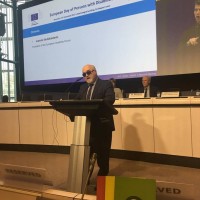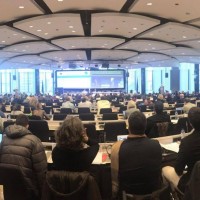
Την έναρξη του Συνεδρίου για τα άτομα με αναπηρία, που συνδιοργανώνεται από το Ευρωπαϊκό Φόρουμ Ατόμων με Αναπηρία και την Ευρωπαϊκή Επιτροπή, κήρυξε σήμερα από τις Βρυξέλλες ο Πρόεδρος της ΕΣΑμεΑ και του EDF Ιωάννης Βαρδακαστάνης, από κοινού με τον κ. Michel Servoz, Ευρωπαίο Επίτροπο για την Εργασία, τις Κοινωνικές Υποθέσεις και την Ένταξη. Το Συνέδριο αυτό αποτελεί μέρος των ευρύτερων προσπαθειών της ΕΕ για την προώθηση της ένταξης των θεμάτων αναπηρίας σύμφωνα με τη Σύμβαση των Ηνωμένων Εθνών για τα Δικαιώματα των Ατόμων με Αναπηρία στις οποίες η ΕΕ είναι συμβαλλόμενο μέρος από τον Ιανουάριο του 2011 και σύμφωνα με τη Στρατηγική για την Αναπηρία 2010-2020 της ΕΕ.
Στην έναρξη του Συνεδρίου ο κ. Βαρδακαστάνης τόνισε:
Προκειμένου τα άτομα με αναπηρία να είναι πολίτες σε ισότιμη βάση με τους άλλους, πρέπει να συνεργαστούμε για την άρση όλων των εμποδίων στην απασχόληση, την κοινωνική προστασία, την πολιτική συμμετοχή και την προσβασιμότητα. Η ισότητα σημαίνει ίσα δικαιώματα για όλους τους πολίτες ενώπιον του νόμου. Η αρχή της ισότητας μεταξύ γυναικών και ανδρών στηρίζει όλες τις ευρωπαϊκές πολιτικές και αποτελεί τη βάση για την ευρωπαϊκή ολοκλήρωση. Εφαρμόζεται σε όλους τους τομείς. Η αρχή της ίσης αμοιβής για ίση εργασία είναι επίσης σημαντική εδώ. Όλα όσα κάνει η ΕΕ βασίζονται σε συνθήκες, οι οποίες συμφωνούνται οικειοθελώς και δημοκρατικά από τα κράτη μέλη της. Η νομοθεσία και η δικαιοσύνη υποστηρίζονται από ανεξάρτητο δικαστικό σώμα. Στο πλαίσιο του κράτους δικαίου της ΕΕ, η σύμβαση των Ηνωμένων Εθνών για τα δικαιώματα των ατόμων με αναπηρία πρέπει να βρει τη θέση της.
Για να είσαι ισότιμος πολίτης, πρέπει να μπορείς να ασκείς ανεμπόδιστα και ισότιμα τα δικαιώματά σου. Να είσαι δηλαδή αναπόσπαστο ενεργό μέλος της κοινωνίας. Να μην είσαι στο περιθώριο. Και για αυτό αγωνιζόμαστε και αυτό επιδιώκουμε. Και αυτό θα είναι το πάνδημο αίτημα των 800 και πλέον αντιπροσώπων των οργανώσεων των ατόμων με αναπηρία στο 4ο Ευρωπαϊκό Κοινοβούλιο Ατόμων με Αναπηρία την Τέταρτη, 6 Δεκεμβρίου 2017.
Άτομα με αναπηρία, οργανώσεις ατόμων με αναπηρία, ενώσεις και εταιρείες που εργάζονται για τη βελτίωση της ζωής των ατόμων με αναπηρία, κυβερνητικοί εκπρόσωποι, εκπρόσωποι των θεσμικών οργάνων της ΕΕ, ακαδημαϊκοί και πολλοί άλλοι παίρνουν μέρος στο Συνέδριο.
Φέτος, η Ευρωπαϊκή Ημέρα των Ατόμων με Αναπηρία επικεντρώνεται στην ιδιότητα του πολίτη. Συζητιούνται τα δικαιώματα των πολιτών της ΕΕ μέσω ποικίλων πρωτοβουλιών της ΕΕ, το ζήτημα της πολιτικής συμμετοχής αλλά και η δυνατότητα διαβίωσης σε ένα δικαιότερο και πιο προσβάσιμο περιβάλλον.
Σκοπός του Συνεδρίου είναι να κατευθύνει τους συμμετέχοντες προς την κατεύθυνση συγκεκριμένων λύσεων για τη βελτίωση της καθημερινής ζωής των ατόμων με αναπηρία.
Το Συνέδριο που διαρκεί από τις 4 έως τις 5 Δεκεμβρίου μεταδίδει τις εργασίες του ζωντανά (περισσότερες πληροφορίες και σύνδεσμοι για τη ζωντανή μετάδοση).
Η ομιλία του κ. Βαρδακαστάνη στα αγγλικά:
It is a pleasure to join the European Commission in welcoming you at the European Day of Persons with disabilities conference. This is a time to celebrate the rights of persons with disability and to claim our place in society as citizens.
“We are EU citizens” is the theme of this year. Citizens are those belonging to a specific State. Specific rights and duties derive directly from the fact of being a citizen of one place. Being EU citizens, being therefore a member of the European Union, gives us the rights and responsibility to contribute to the European project.
The project we all adhere and want to promote is based on the core values as defined by the Lisbon treaty and the EU charter of Fundamental Rights: “EU values are common to the member countries in a society in which inclusion, tolerance, justice, solidarity and non-discrimination prevail. These values are Human dignity, freedom, democracy, equality, rule of law, human rights. They are described as follow:
Human dignity is inviolable. It must be respected, protected and constitutes the real basis of fundamental rights.
Freedom of movement gives citizens the right to move and reside freely within the Union. Individual freedoms such as respect for private life, freedom of thought, religion, assembly, expression and information are protected by the EU Charter of Fundamental Rights.
Democracy: Being a European citizen also means enjoying political rights. Every adult EU citizen has the right to stand as a candidate and to vote in elections to the European Parliament. EU citizens have the right to stand as candidate and to vote in their country of residence, or in their country of origin.
The participation of persons with disabilities in society cannot be full and effective without properly including them in the political life as any other EU citizen
However, hundreds of thousands of persons with disabilities are deprived from the right to vote and to be elected and they do not enjoy equal opportunities to enter politics.
Equality is about equal rights for all citizens before the law. The principle of equality between women and men underpins all European policies and is the basis for European integration. It applies in all areas. The principle of equal pay for equal work is also relevant here.
Rule of law: the EU is based on the rule of law. Everything the EU does is founded on treaties, voluntarily and democratically agreed by its member countries. Law and justice are upheld by an independent judiciary. In the EU rule of law the UN Convention on the Rights of persons with disabilities must find its place.
And last and extremely important the value of human rights: Human rights are protected by the EU Charter of Fundamental Rights and the UN CRPD. These cover the right to be free from discrimination on the basis of sex, racial or ethnic origin, religion or belief, disability, age or sexual orientation, the right to the protection of your personal data, and or the right to get access to justice.
Social Europe is framed by the newly proclaimed Pillar of social rights. This will be the guidance for progress in the field of social rights.
We believe that the social pillar should be instrumental to fulfil the EU commitments under the CRPD. The UN CRPD should be understood as a comprehensive Convention addressing all levels and areas of policy making. For this reason, we call on the EU to work towards an overarching and comprehensive strategy for implementation of the UN CRPD for 2020-2030 – following the recommendation made by the CRPD Committee in Geneva. In order to achieve the full and adequate implementation of the CRPD, the Strategy should be integrated in the forthcoming EU Multiannual financial framework.
This comprehensive strategy should ensure a meaningful, structured dialogue with the representative organisations of persons with disabilities.
For persons with disabilities to be citizens on an equal basis with others we need to enforce all the rights defined in the EU values. We have to work together to remove all barriers to employment, to social protection, to political participation and to accessibility for persons with disabilities.
Today and tomorrow, there will be the possibility to raise awareness the right to access to social protection, enjoyment of the right to political participation and accessibility of cities for persons with disabilities. And we look forward to the discussions ahead of us.

